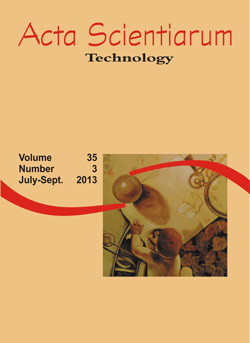<b>Strategies to inhibit the lipid oxidation in the enzymatic synthesis of monoglycerides by glycerolysis of Babassu oil</b> - doi: 10.4025/actascitechnol.v35i3.14187
DOI:
https://doi.org/10.4025/actascitechnol.v35i3.14187Keywords:
lipase, monoacylglycerol, antioxidantAbstract
Different strategies to avoid the lipid feedstock oxidation in the enzymatic synthesis of monoglycerides (MAG) from glycerolysis of babassu oil were tested. The reactions were catalyzed by Burkholderia cepacia lipase immobilized on SiO2-PVA and the tests carried out in batchwise. The best strategy was tested in a continuous packed-bed reactor. Different antioxidants and emulsifiers were used, including: Buthyl-hydroxy-toluene (BHT), tocopherol, soy lecithin and Triton X-100. The influence of inert atmosphere (N2) on the MAG production was also investigated. Results were compared with those attaining in the control reaction. The best performance was obtained using N2 in the reaction medium, preventing the oxidation of babassu oil. MAG concentrations were 60 and 24% in batch and continuous mode, respectively. Among the tested antioxidant and emulsifying agents, only soy lecithin was found to be efficient but its application showed limit performance to be used in continuous runs.Â
Downloads
Download data is not yet available.
Downloads
Published
2013-02-27
How to Cite
Freitas, L., Dors, G., Carneiro, B. C., Oliveira, P. C. de, & Castro, H. F. D. (2013). <b>Strategies to inhibit the lipid oxidation in the enzymatic synthesis of monoglycerides by glycerolysis of Babassu oil</b> - doi: 10.4025/actascitechnol.v35i3.14187. Acta Scientiarum. Technology, 35(3), 491–497. https://doi.org/10.4025/actascitechnol.v35i3.14187
Issue
Section
Chemical Engineering
License
DECLARATION OF ORIGINALITY AND COPYRIGHTS
I Declare that current article is original and has not been submitted for publication, in part or in whole, to any other national or international journal.
The copyrights belong exclusively to the authors. Published content is licensed under Creative Commons Attribution 4.0 (CC BY 4.0) guidelines, which allows sharing (copy and distribution of the material in any medium or format) and adaptation (remix, transform, and build upon the material) for any purpose, even commercially, under the terms of attribution.
Read this link for further information on how to use CC BY 4.0 properly.















8.png)




